Greetings! I'm Aneesh Sreedharan, CEO of 2Hats Logic Solutions. At 2Hats Logic Solutions, we are dedicated to providing technical expertise and resolving your concerns in the world of technology. Our blog page serves as a resource where we share insights and experiences, offering valuable perspectives on your queries.

Quick Summary
Remote teams face major challenges with scattered data, communication gaps, and lack of real-time visibility. ERP tools solve these problems by centralizing business processes, enabling real-time collaboration, and providing comprehensive project management capabilities. The right ERP system transforms chaotic remote work into productive operations.
Sarah’s marketing team was struggling. With team members spread across three time zones, project deadlines were slipping through the cracks. Client data lived in one system, project timelines in another, and financial reports in a third.
This scenario plays out daily in remote teams worldwide. Without the right tools, managing distributed teams becomes a nightmare. This will cause missed communications, duplicated work, and frustrated employees. The solution? Enterprise Resource Planning (ERP) tools designed specifically for remote team management.
Ready to transform your remote team management? Let our ERP experts help you choose the perfect solution.
What Is ERP and Why Remote Teams Need It
ERP stands for Enterprise Resource Planning. Think of it as the central system of your business operations. It integrates all your core processes that includes finance, project management, human resources, inventory, and customer relations. This is all in one unified platform.
For remote teams, ERP systems act as the digital headquarters where everyone can access the same information, collaborate in real-time, and stay aligned on priorities. Instead of juggling multiple tools and platforms, your team works from a single source of origin.
The Remote Team Management Challenges
Take a look at the challenges faced when managing remote teams. Also find how ERP tools can help to manage remote team.
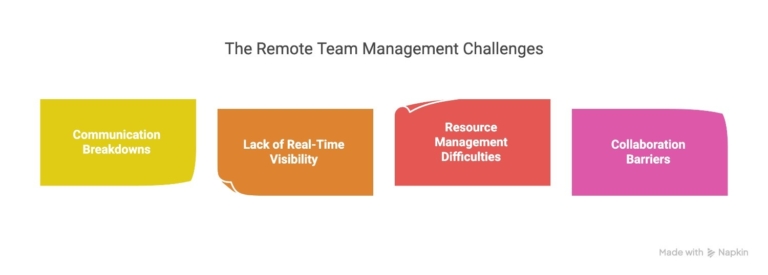
Communication Breakdowns
Remote teams often struggle with information silos. Marketing doesn’t know what sales is doing. Finance can’t track project expenses in real-time. Team members work with outdated information because updates don’t reach everyone.
Lack of Real-Time Visibility
Without physical proximity, managers lose visibility into team productivity and project progress. Traditional tools don’t provide the comprehensive oversight needed to manage distributed teams effectively.
Resource Management Difficulties
Tracking time, allocating resources, and managing budgets becomes exponentially harder when teams are scattered. Manual processes lead to errors and inefficiencies.
Collaboration Barriers
Different time zones, varying work schedules, and multiple communication channels create collaboration challenges that traditional tools can’t adequately address.
Stop losing track of projects and deadlines. Streamline your remote operations with the right ERP system.
How ERP Tools Transform Remote Team Management
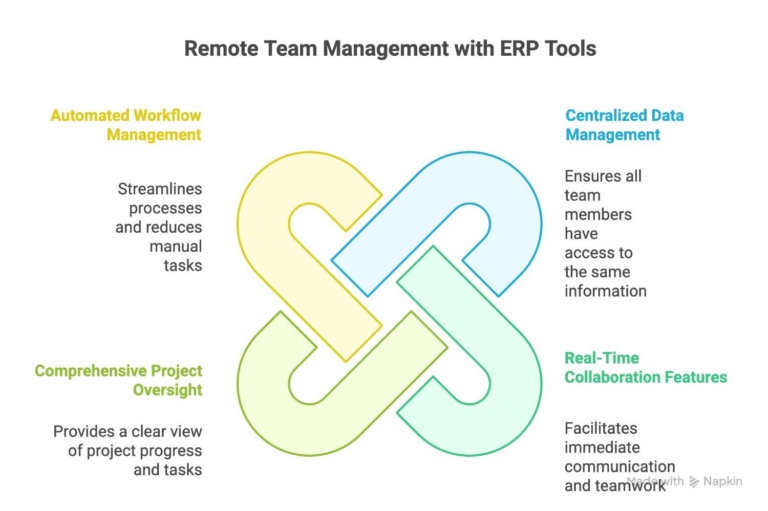
Centralized Data Management
ERP systems eliminate data silos by storing all business information in one centralized database. Team members access the same real-time data regardless of location, ensuring everyone works with current information.
Real-Time Collaboration Features
Modern ERP tools include built-in collaboration features like shared calendars, project boards, and messaging systems. Team members can comment on tasks, share files, and provide updates without switching between applications.
Comprehensive Project Oversight
Managers gain complete visibility into project progress, resource allocation, and team performance through customizable dashboards and real-time reporting. This transparency helps identify bottlenecks before they become problems.
Automated Workflow Management
ERP systems automate routine tasks like deadline reminders, status updates, and resource allocation. This reduces manual administrative work and ensures nothing falls through the cracks.
Top ERP Tools for Remote Teams
Take a look at the top ERP tools suitable for the remote teams.
1. NetSuite ERP
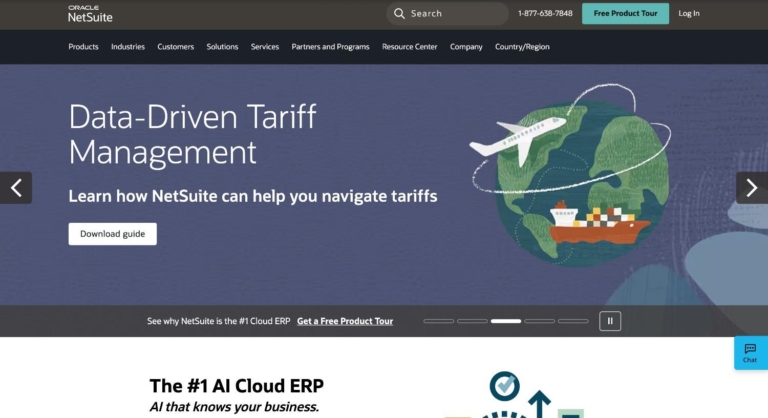
NetSuite offers a comprehensive cloud-based solution that integrates CRM, project management, financials, and e-commerce in one platform. Its real-time dashboards provide complete visibility into business operations.
Key Features:
- Multi-currency and multi-language support
- Advanced financial reporting
- Integrated project management
- Mobile accessibility
- Customizable workflows
Best For: Growing businesses that need comprehensive functionality and scalability.
2. Microsoft Dynamics 365 Business Central
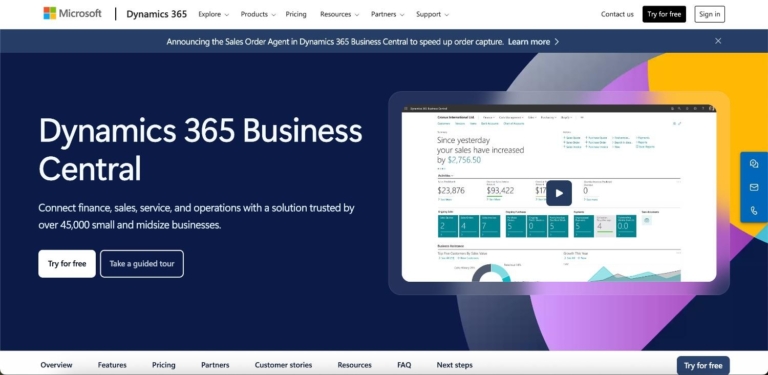
Microsoft’s ERP solution seamlessly integrates with other Microsoft products like Teams, Outlook, and SharePoint. This makes it particularly attractive for teams already using Microsoft’s ecosystem.
Key Features:
- Native Microsoft integration
- AI-powered insights
- Power BI analytics
- Mobile and desktop access
- Flexible deployment options
Best For: Organizations heavily invested in Microsoft technologies.
3. Acumatica Cloud ERP

Built specifically for the cloud, Acumatica offers flexible deployment options and consumption-based pricing. Its modular design allows teams to customize the system to their specific needs.
Key Features:
- True cloud architecture
- Mobile-first design
- Flexible licensing model
- Open API integrations
- Industry-specific modules
Best For: Small to medium businesses seeking cloud-native flexibility.
4. Odoo ERP
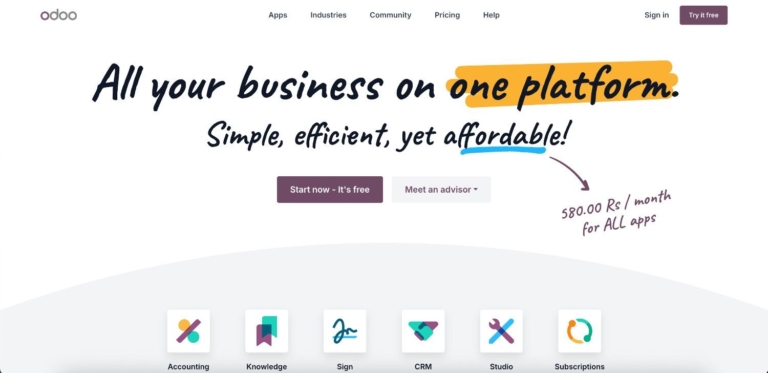
Odoo provides an open-source ERP solution with a wide range of applications covering everything from project management to human resources. Its affordable pricing makes it accessible to smaller teams.
Key Features:
- Open-source flexibility
- Extensive app ecosystem
- Affordable pricing
- User-friendly interface
- Customizable workflows
Best For: Budget-conscious teams that need customization capabilities.
5. Oracle ERP Cloud
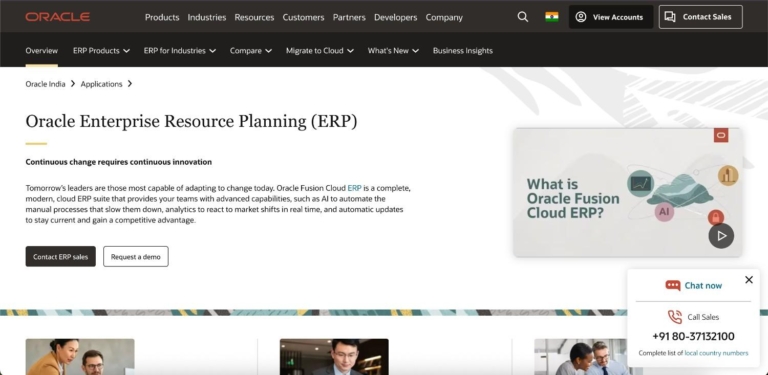
Oracle’s enterprise-grade solution offers robust features for large organizations with complex requirements. Its AI-enhanced tools provide predictive analytics and automation.
Key Features:
- AI-powered automation
- Global business management
- Advanced security
- Scalable infrastructure
- Comprehensive reporting
Best For: Large enterprises with complex operational requirements.
Not sure which ERP fits your team size and budget? Get personalized recommendations from our specialists.
Key Features to Look for in Remote Team ERP
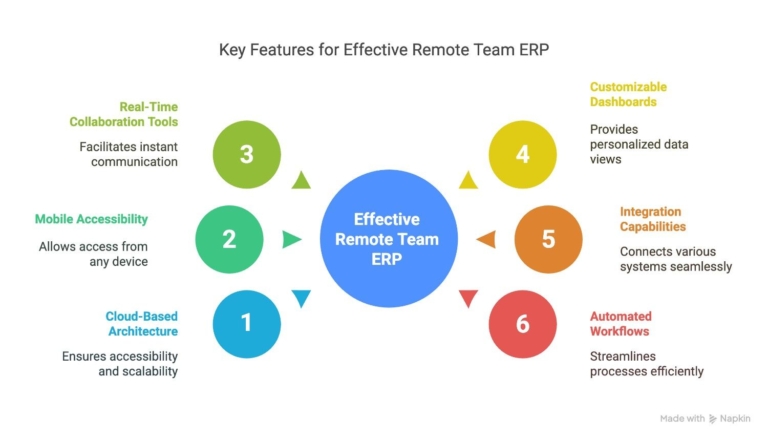
Cloud-Based Architecture
Choose solutions that operate entirely in the cloud. This ensures team members can access the system from anywhere with an internet connection, eliminating the need for VPN access or local installations.
Mobile Accessibility
Your ERP should offer full functionality on mobile devices. Remote team members need to update project status, approve expenses, and access critical information while on the go.
Real-Time Collaboration Tools
Look for built-in messaging, commenting, and file sharing capabilities. The ability to collaborate directly within the ERP system reduces the need for external communication tools.
Customizable Dashboards
Different team members need different views of the data. Customizable dashboards allow each user to focus on the metrics and information most relevant to their role.
Integration Capabilities
Your ERP should integrate seamlessly with existing tools like email, calendar applications, and communication platforms. This reduces context switching and improves productivity.
Automated Workflows
Automation features reduce manual administrative tasks and ensure consistent processes across the team. Look for tools that can automatically assign tasks, send reminders, and generate reports.
Overcoming Common Implementation Challenges
With benefits comes challenges, find out how you can tackle challenges that comes with implementation.
User Adoption Resistance
Address concerns early by involving team members in the selection process. Demonstrate clear benefits and provide adequate training to build confidence.
Data Migration Complexity
Plan data migration carefully, especially when consolidating multiple systems. Consider working with implementation partners who specialize in your chosen ERP platform.
Integration Difficulties
Test integrations thoroughly before going live. Ensure all critical systems communicate properly to avoid workflow disruptions.
Customization Overwhelm
Start with basic functionality and gradually add customizations. Too many changes at once can overwhelm users and complicate the implementation process.
Conclusion
Managing remote teams successfully requires more than good intentions and video calls. It demands the right technology infrastructure to support collaboration, communication, and coordination across distances and time zones. ERP tools designed for remote work provide the foundation for effective distributed team management. They eliminate data silos, improve communication, and give managers the visibility they need to lead effectively.
The key is choosing a solution that fits your team’s specific needs, implementing it thoughtfully, and continuously optimizing based on user feedback. With the right ERP system in place, remote teams can achieve the same level of coordination and productivity as co-located teams, often exceeding it.
Your team’s success depends on having the right team to integrate the ERP tools. Get experts ERP integration services for an exceptional performance.

Related Articles







